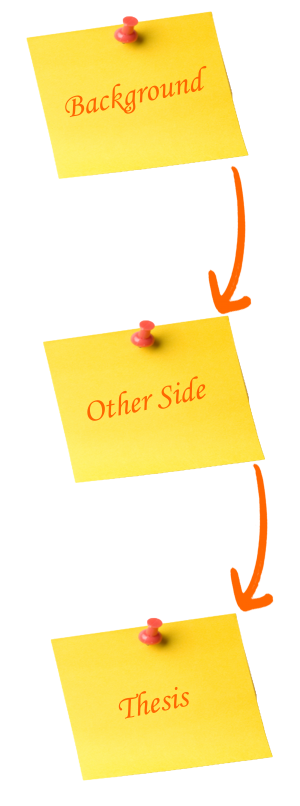Intro Paragraph
How To Write An Intro
1
2
3
In answering the question you MUST mention all regions or dates from the question if applicable (although you should do it in a slightly different fashion than the question). Remember to understand the verbs they are using in the question (‘analyze’ means how and why did it happen for instance), because if the thesis doesn’t cover all of this it sets off a chain reaction where you lose points all over your essay.

Answering the question
According to teachers, the biggest problem that students have in essays is answering the question. Students will often present a thesis that is related to the subject, but doesn’t actually answer the question or prompt. Not only should students pay significantly more attention to this issue, but teachers need to spend more time explaining these issues.
Students need to remember that questions have 3 “axis” of specificity in essays that are called: Time, Place, and Topic. If your essay (and especially your thesis) does not include these 3 axis of specificity then you are missing the basics of the question. The most difficult part of these is the ‘Topic’ since it forces the student to pursue this essay in very specific ways depending on the wording used. Writing a compare and contrast (C&C) essay is different than writing a change over time (CoT) essay in structure and focus. Understanding these differences are important and require practice to master.

Writing A Thesis
What is a thesis?
The thesis is a single sentence that answers the prompt with a clearly stated, strong opinion. It is always be found in the last sentence of the first paragraph and should be an issue that is controversial enough that someone could argue the other position (so don’t say the sky is blue, because it’s not controversial enough). EVERY WORD of your paper should be centered around supporting this idea, so it has to be worded perfectly to include what you are trying to prove. For this reason, having a poor thesis causes a chain reaction that could lead to you failing the essay.
A good thesis makes the reader feel that you have thoroughly explored the evidence and discovered an answer that can be backed up with facts. So students should always carefully weigh the historical evidence and then craft a response that best articulates the argument that has the most persuasive evidence behind it.
It is important to remember to keep your thesis strong. A weak thesis or one that agrees with both sides is a kiss of death for a thesis. You MUST take a side and avoid this type of thesis at all costs.
The labor unions dealt with both positive and negative during the last decades of the 19th century
Once you have some idea of what the research says you need to come up with a thesis itself. Since the thesis is supposed to be thought out and well developed, it might take some time before you are ready to answer it. You should research all evidence on the topic first so that you can make sure you form an argument that is supportable with the facts.
What works is having an essay that shows some of the complexity of the argument, but in the end is quite specific about what you are trying to prove. Doing this opens the possibility of using counter arguments in the body paragraphs to disprove them (use this sparingly though and only within larger points). The best way to do this is to start the thesis with one of the following words: although, while, despite, or in spite of. So the following is the way these would be written.
Although [opposing evidence], [reasons] show [Something] [does something].
It is important to remember not to give a list of reasons here (like they teach you in middle school) but a general overview of what helps prove this. So instead of saying that something is bad because of A, B, and C, you would instead say something like “most academic studies show.”
Once the thesis is written, re-read it to make sure that it doesn’t include any vague words. Your argument must remain strong, so the removal of these words is a must. Then analyze the wording to make sure that it would include all of the facts that you want to use in the essay. Remember that nothing can be covered in the body of the essay that doesn’t directly prove the thesis (you will later analyze the body in the same way to make sure that everything aligns perfectly).
Finally you should ask yourself the following 3 questions in deciding whether your thesis works.
- Is it an opinion?
- Is it debatable?
- Is it specific?
The first step is to work on the direct part of a thesis statement. This will be the strength of the final product. You will need to be specific, clear and strong in some fashion. So here are some examples of “direct” thesis statements.
Bad: George Washington set many important precedents as president.
This is a fact not a position
Good: The precedents that Washington set as America’s first president greatly benefited the American political system.
This is a clear position that can be supported or opposed.
Weak: The Revolutionary War brought about change in American society.
This is, technically, a position. But, it is vague and not really debatable.
Strong: The Revolutionary War ushered in a slew of wide-ranging and permanent social changes in American society.
This is a clear, strong, and debatable thesis.
- Your point MUST be extremely clear
- Never, ever use 1st person pronouns
- Do not just restate the question or ask a question that you answer
- Thesis should ALWAYS be the last sentence of the 1st paragraph
- Also be very careful of using 2nd person pronouns
- Do not give me a list of reasons why you think this. Leave this to your body paragraphs
Sample Prompt:
Jacksonian Democrats viewed themselves as the guardians of the United States Constitution, political democracy, individual liberty, and equality of economic opportunity. In light of your knowledge of the following documents and your knowledge of the 1820’s and 1830’s, to what extent do you agree with the Jacksonians’ view of themselves?
Thesis statements in this course should focus on the “complex-direct” method of thesis statements. This couples the clarity of the direct approach, which just answers the question simply as seen in the below sample thesis.
To a remarkable degree Jacksonian democrats succeeded in implementing their vision of American society.
Once you have an argument in this format you add in the complexity. This acknowledges that contrary evidence exists, but in the end it tries to prove the opposite. Remember to add keywords such as “although” in this type of thesis. You would use the skeleton from example A to write Example B:
Skeleton:
Although [opposing evidence], [reasons] show [Something] [does something].
Example using Skeleton:
Although Jacksonian Democrats truly believed that they were the guardians of American ideals, their actions betrayed other priorities and rarely lived up to either their rhetoric or intentions.
Sample Prompt:
How successful was organized labor in improving the position of workers in the period from 1875 to 1900? Analyze the factors that contributed to the level of success achieved.
Now make sure that some of the words and phrases used in the prompt are reworded so that it is not using the exact same phrasing. Rather than saying “the time period 1875 to 1900,” say “the last decades of the 19th century” or “the three decades following the Civil War.” Rather than saying “organized labor,” refer to labor unions.
Let’s assume that your knowledge of history tells you that this was NOT a period of labor success. Write a sentence that answers the prompt with your argument.
The last 30 years of the 1800’s nearly destroyed organized labor.
Or
These years were a period of extreme struggle for organized labor
After knowing what you want the focus to be you write a thesis in the complex-direct method.
Possible Thesis:
Although the last decades of the 19th century were periods of intense labor organization, due to the heavy handed approach of some in the industry, they nearly destroyed the labor unions.
